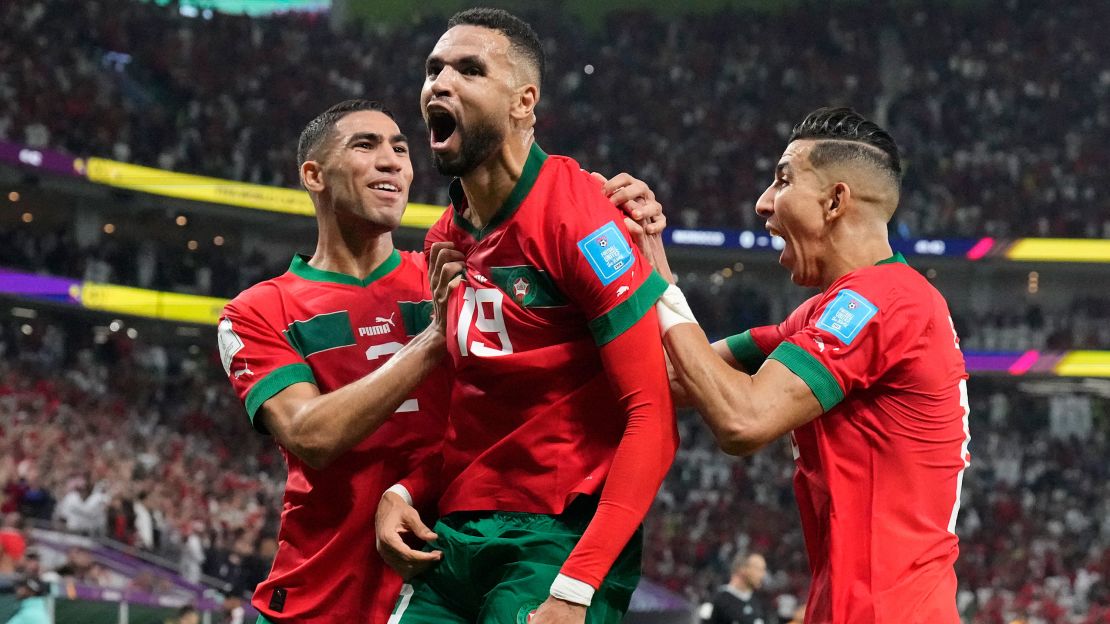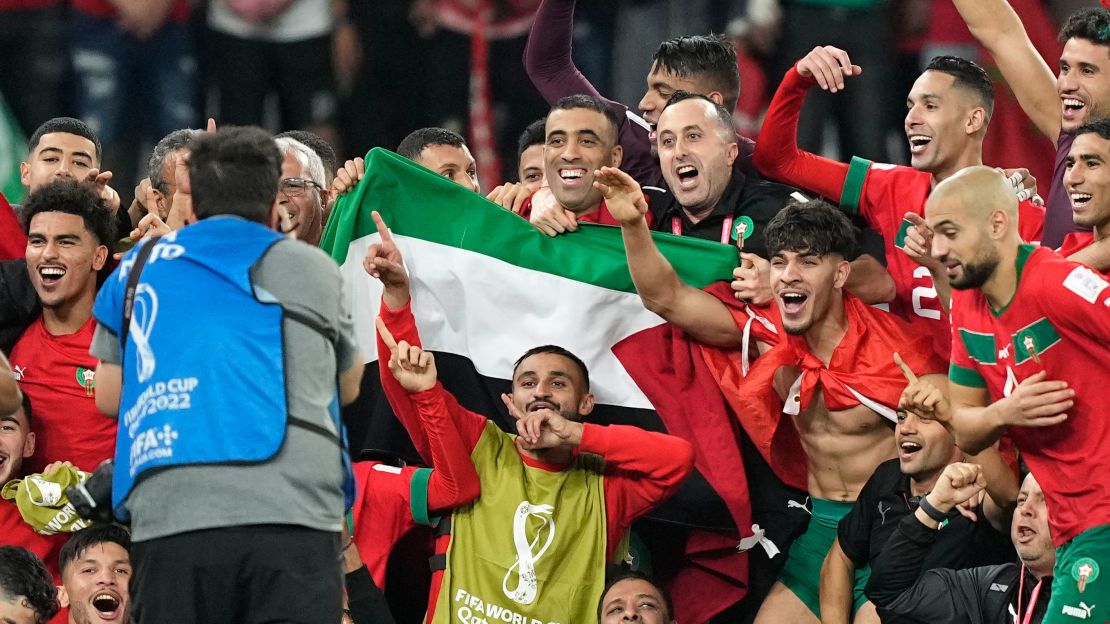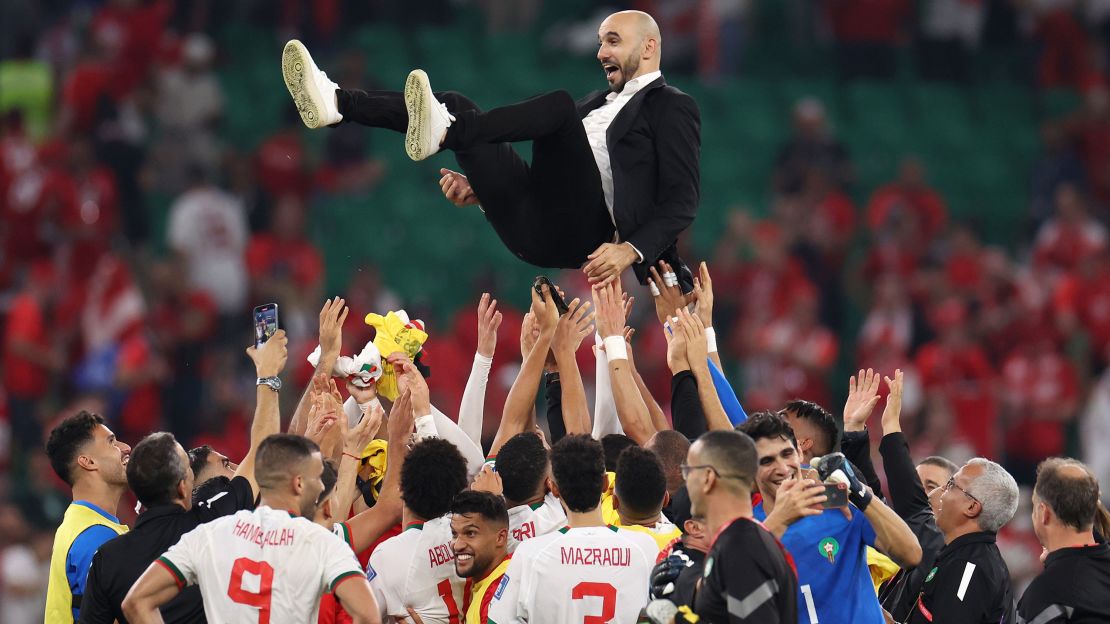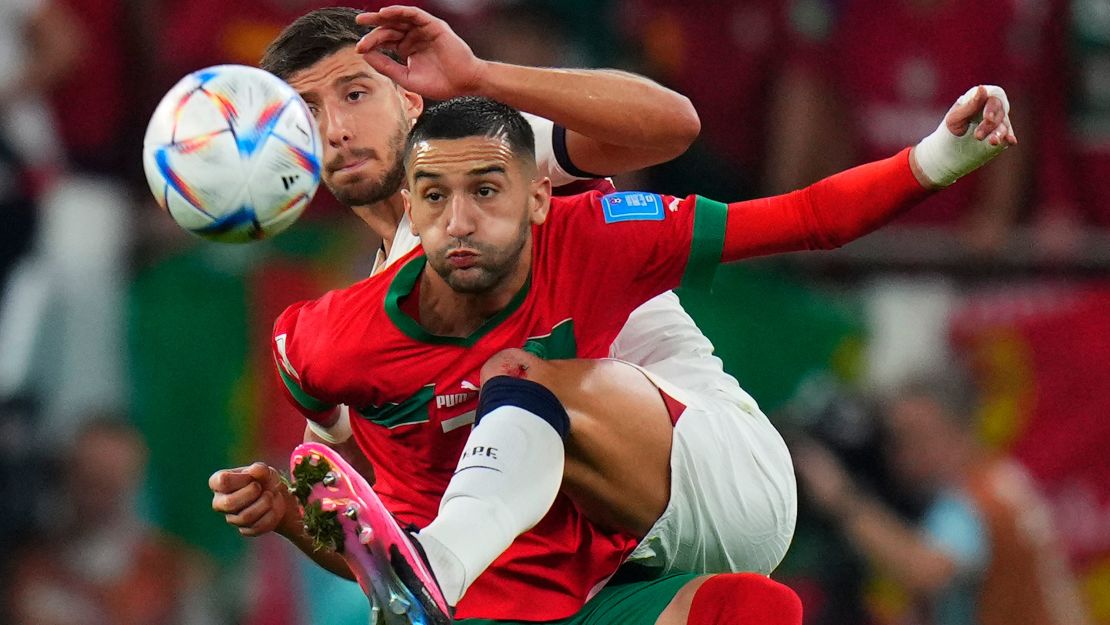Editor’s Note: A version of this story appears in today’s Meanwhile in the Middle East newsletter, CNN’s three-times-a-week look inside the region’s biggest stories. Sign up here
They’re known as The Atlas Lions, the Moroccan football team that’s ripped up the history books at the FIFA World Cup. Their run has upended all expectations, advancing deep into uncharted territory, further than they or any other African team has ever managed before.
Cartographers of the beautiful game know that the world football map has been permanently redrawn in Qatar.
Morocco’s progress has produced some memorable moments, a draw against the 2018 finalists Croatia, a stirring win against second-ranked Belgium, and another victory against Canada saw the Lions roar to the top of their group. Images of the coach Walid Regragui being tossed joyfully into the air, and the players prostrating on the turf in prayer, have become iconic. But arguably the most powerful and heart-warming scenes of the tournament have been of these battle-hardened conquering heroes celebrating so openly, and sometimes goofily, with their mothers.
The players’ families have been integral to the success of a team whose foreign-born players come from six different countries, North African football expert Maher Mezahi told CNN. “Coach Walid Regragui told them, ‘We all have different cultural baggage, but the one thing that unites us is our parents. And we won’t have any success if our parents aren’t happy,’” said Mezahi.

It’s a feel-good vibe which has spread far beyond the stadiums and streets of Qatar, and which is at odds with a more common narrative in an Arab world riddled with growing youth unemployment, ballooning inflation, rising poverty rates and political violence.
It’s “a source of joy for a region that’s been marred by violence and upheaval,” Samia Errazzouki, a PhD candidate in Northwest African history at UC Davis, told CNN. “I think this moment of joy resonates with everyone who is downtrodden.”
Morocco’s success has also breathed new life into a once-lost identity, as people from across the Arab world celebrated the team’s victories. “People had said that Arab nationalism was dead, we’re not united anymore,” said Mezahi. “The Olympics, Algeria’s run in the 2014 World Cup, and especially now this, as trivial of a notion as it seems, it exists, and we’re seeing it manifest in real time.”
The Palestinian cause, which is central to the identity of many Arabs around the world, has been omnipresent in the stadiums and on the streets during this tournament. When the Moroccan team posed with the unmistakable tricolor flag during their celebrations, the cause – which supports Palestinian self-determination – benefited from the oxygen of a global media platform.
A Monday night stroll through Qatar’s Souq Waqif revealed football fans from all over the region who were draped in both the Palestinian and Moroccan flags. CNN spoke with 15-year-old boys from Syria and Egypt, 17-year-old girls from Sudan, a man from Algeria and another from the occupied West Bank city of Nablus. “All Arab countries, from the Gulf to the sea, are one body,” said Anwar Ramadan, who walked through the Souq with a “Free Palestine” scarf around his shoulders. He told CNN that he wears the flag so that the rest of the world can see that “Palestine is present in every corner.”

“We hope that Arab leaders will be capable of uniting this region in the same way that the Emir of Qatar was able to unite all Arabs in this country during the World Cup,” Ramadan said.
Amro Ali, a Sociology professor at the Hassan II University Casablanca, argued that Qatar has given supporters of the Palestinian cause an “unfiltered and unmediated” space, where they could express solidarity with the plight of Palestinians in occupied territories.
In 2020, Morocco was one of four Arab countries to normalize relations with Israel, departing from a long-time regional policy that conditioned normalization on ending the Israeli occupation of the West Bank and Gaza, where Israel still maintains a blockade alongside Egypt. Sweeping displays of solidarity with Palestinians highlights the disconnect between those governments’ official positions and continued hostility towards Israel.
“If anything, [the World Cup] has shown the stark contrast between the rulers and the ruled, between the regimes and the publics,” he said. “Palestine has not been forgotten.”
Morocco’s success in 2022, and the regional pride which has flourished as a result, is at odds with the prevailing narrative in the buildup to this tournament, which focused on human and civil rights abuses. While these were important to highlight, the blunt intensity of the stories left many residents of Qatar, and the region more broadly, reeling. Many in Qatar have accused the critics of racism.

After the games in which Morocco beat Canada, Spain and then Portugal, CNN spoke with jubilant fans late into the night. They hailed from Morocco, Egypt and Saudi Arabia, Orlando and London, and often their ecstatic reaction to the result would segue, unsolicited, into praise for the tournament hosts. “I think I am surely in a dream,” one man said, before being swept away by the crowd, “Thank you Qatar for the great organization.” Another supporter said he hoped that Morocco could make the Arab region proud, before adding, “I want to thank Qatar for this event, bringing all different nationalities together, making us feel the same, like brothers.”
A few days before he was filmed dancing with his mother, midfielder Sofiane Boufal thanked his fans. “All Moroccans all over the world, all Arab people and all Muslim people.” But his coach has tried to reframe it as an achievement for his continent, and not for speakers of the Arabic language. “I’m not here to be a politician,” Regragui told Goal magazine. “We want to fly Africa’s flag high just like Senegal, Ghana and Cameroon. We are here to represent Africa.”
It can feel like there is a sense of destiny to it all. Morocco’s soccer team prevailed over two of their former colonizers – Spain and Portugal – and faces off with a third – France – in the historic semifinal on Wednesday night.

Like a work of art, everybody can draw their own interpretation of Morocco’s path to glory.
Sport has always had the power to change the world, but no matter what happens because of these four weeks in Qatar, the players, fans, and journalists covering the games know that it doesn’t need to be amplified beyond the touchline to be special.
Moroccan sports journalists covering the games have said that they’re trying to soak up every single detail, because they know that in 40 years, future generations will demand a visceral reproduction of these historical events.
By then, the story will be a fable. The players will have become almost mythical figures, and the supporting cast, especially the women, will be central to it. The mothers’ pride of The Atlas Lions will never be forgotten.
CNN’s Kim Makhlouf and Abbas Asim contributed to this report from Doha.

